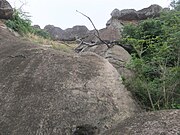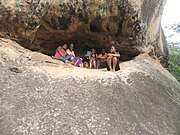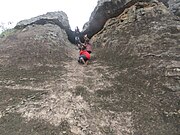Tanoboase Sacred Grove and Shrine
Tanoboase Sacred Grove and Shrine is near the village of Tanoboase in the Techiman, Brong Ahafo region of Ghana. It is believed to be the cradle and the traditional home of the Bono people. It is said by the Tanoboase people that powerful Ashanti Gods reside in the sacred grove. Historically the site is where Ashanti Wars were fought. The grove was a hideout during the slave trade and inter-tribal wars. The grove is also a place for religious activities.[1]
History
Tano is the name given to several gods. The word Tano has its origins in the Tano River.
The Tano sacred grove and shrine is one of many sacred groves in Ghana, West Africa. The rock shrine is inside of the sacred grove. Inside the rock shrine is the original brass pan. There are five compartments, the main entrance, durbar ground, hideout, watch tower and stairs.
It is an oasis that maintains biodiversity in culture and religious based knowledge system. Mike Anane writes, "It is gratifying that in Ghana today, some NGOs and scholars are recognizing the importance of various traditional religious beliefs or culture-based knowledge systems in addressing alarming problems of environment and development ... The old 'top-down' or paternalistic forms of development can no longer be enough in the face of environmental catastrophe."[2]
In 1996, the Grove became a Community Based-Ecotourism Project (CBEP).[3]
The Tanoboase Sacred Grove and Shrine is part of Ghana's material cultural heritage.
In 2001, the Sacred grove was selected to be an eco-tourism site with the support of the Ghana Association for the Conservation of Nature (GACON).[4]
Beliefs and practices
The Tano sacred grove and rock shrine is a traditional conservation practice bedded in indigenous religion of the Bono people of Ghana. The sacred grove is believed by the Bono people to be the abode of local gods, and ancestral spirits. It is also the home of super natural beings.[5]
Oral tradition is passed down from generation to generation about the founding of the sacred grove. Legend is that the deity Taakora manifested to Afya Ankomah with instructions to follow. The instructions enabled the Bono people to live in the rock caves. The instructions were that the people were not to hunt or farm in the sacred grove. The caves were shelter. They gave the Bonos security and were used as hideouts for kings.[3][6]
Gallery
-
Sacred Grove and Shrine
-
Tano Rock Shrine in Tanoboase, Ghana
-
Tano Rock Shrine located in Tanoboase, Ghana
-
Located in Tanoboase, Ghana
-
Inside the Tano Rock Shrine with tour guide in Tanoboase, Ghana
References
- ^ http://www.yakamhotel.com/yakam-hotel-tano-boase-sacred-groove.html Archived 2019-04-04 at the Wayback Machine
- "Tano Sacred Grove and Shrine, TANO OBUASI, Techimantia (2020)". Local Prayers.
- "Tanoboase Sacred Grove; the first home of Bono people". Graphic Online.
- "Tano Sacred Grove and Shrine". Facebook.
- "Eleven Shadows Travels: Ghana and Frankfurt 2004". Eleven Shadows.
- "Bono (Akan) SpiritualWorldView-Dr. Kwasi Konadu". Scribd.
- "Traditional Akan Spirituality". The Africentric Eye. Archived from the original on 2020-07-28. Retrieved 2020-11-18. - ^ "Sacred Groves of Ghana".
- ^ a b Hannah Asomaning (30 November 2001). "Want a good rainy season? Let the Virgins fill the Odomankoma Ahina". Ghana Web.
- ^ Mfum, Michael Sarpong (March 11, 2013). "TANOBOASE SACRED GROVE A TOURISM POTENIAL IN BRONG AHAFO REGION".
- "Tanoboase". Ghana Place Names. Retrieved 10 January 2023. - ^ Sarfo-Mensah, Paul; Fredua, Ernestina Antoh; Oduro, William; Amisah, Stephen (8 September 2010). "Traditional Representations of the Natural Environment and Biodiversity Conservation: Sacred Groves in Ghana". Fondazione Eni Enrico Mattei Working Papers. GC. doi:10.22004/ag.econ.92787. SSRN 1665065.
- ^ Adom, Dickson (November 2019). "The place and voice of local people, culture, and traditions: A catalyst for ecotourism development in rural communities in Ghana". Scientific African. 6: e00184. doi:10.1016/j.sciaf.2019.e00184.
External links





